英语外研版必修一:module2 my new teachers grammar课件
- 格式:ppt
- 大小:1.65 MB
- 文档页数:31
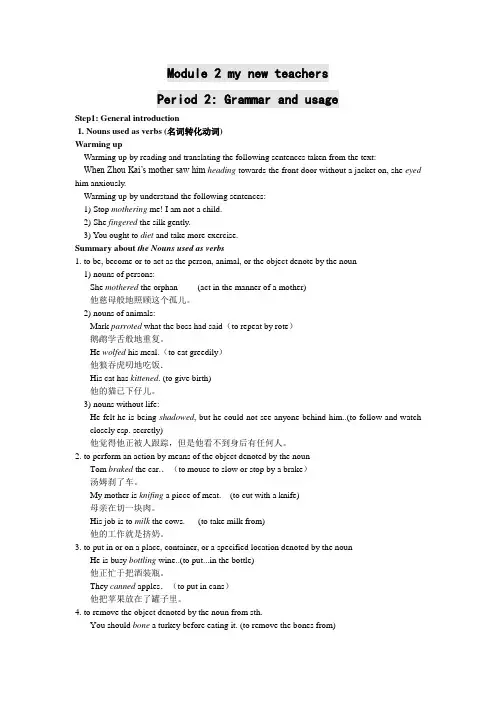
Module 2 my new teachersPeriod 2: Grammar and usageStep1: General introduction1.Nouns used as verbs (名词转化动词)Warming upWarming up by reading and translating the following sentences taken from the text:When Zhou Kai’s mother saw him heading towards the front door without a jacket on, she eyed him anxiously.Warming up by understand the following sentences:1) Stop mothering me! I am not a child.2) She fingered the silk gently.3) You ought to diet and take more exercise.Summary about the Nouns used as verbs1. to be, become or to act as the person, animal, or the object denote by the noun1) nouns of persons:She mothered the orphan (act in the manner of a mother)他慈母般地照顾这个孤儿。
2) nouns of animals:Mark parroted what the boss had said(to repeat by rote)鹅鹉学舌般地重复。
He wolfed his meal.(to eat greedily)他狼吞虎叨地吃饭.His cat has kittened. (to give birth)他的猫已下仔儿。
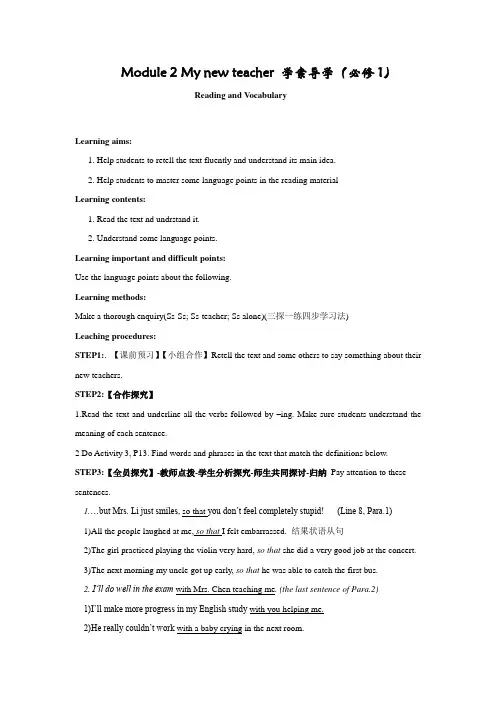
Module 2 My new teacher 学案导学(必修1)Reading and VocabularyLearning aims:1. Help students to retell the text fluently and understand its main idea.2. Help students to master some language points in the reading materialLearning contents:1. Read the text nd undrstand it.2. Understand some language points.Learning important and difficult points:Use the language points about the following.Learning methods:Make a thorough enquiry(Ss-Ss; Ss-teacher; Ss alone)(三探一练四步学习法)Leaching procedures:STEP1:. 【课前预习】【小组合作】Retell the text and some others to say something about their new teachers.STEP2:【合作探究】1.Read the text and underline all the verbs followed by –ing. Make sure students understand the meaning of each sentence.2 Do Activity 3, P13. Find words and phrases in the text that match the definitions below.STEP3:【全员探究】-教师点拨-学生分析探究-师生共同探讨-归纳Pay attention to these sentences.1.…but Mrs. Li just smiles, so that you don’t feel completely stupid! (Line 8, Para.1)1)All the people laughed at me, so that I felt embarrassed. 结果状语从句2)The girl practiced playing the violin very hard, so that she did a very good job at the concert.3)The next morning my uncle got up early, so that he was able to catch the first bus.2.I’ll do well in the exam with Mrs. Chen teaching me. (the last sentence of Para.2)1)I’ll make more progress in my English study with you helping me.2)He really couldn’t work with a baby crying in the next room.3)They walked on with the white snow shining under the sun. ……STEP4:【自学探究】【合作探究】-教师点拨-Learning some more language points:1)Amusing adj. (故事等)有趣的,可笑的Amused adj. (人,表情等)有趣的,可笑的2)energetic adj. 有活力的,精力充沛的Energy n. 能量,能源,精力full of energy3) intelligent adj. 聪明的,理智的。
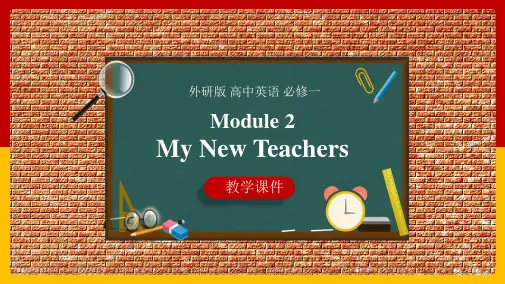
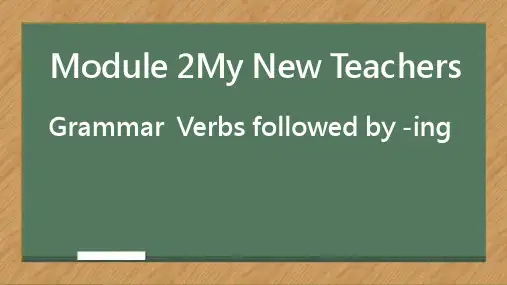
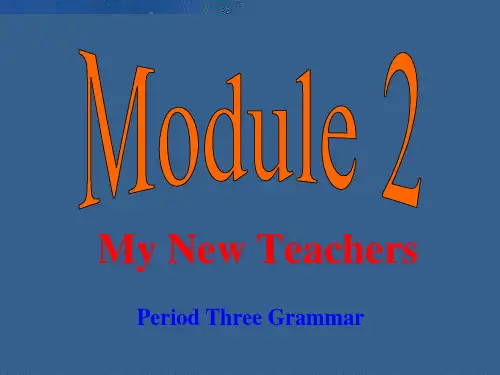
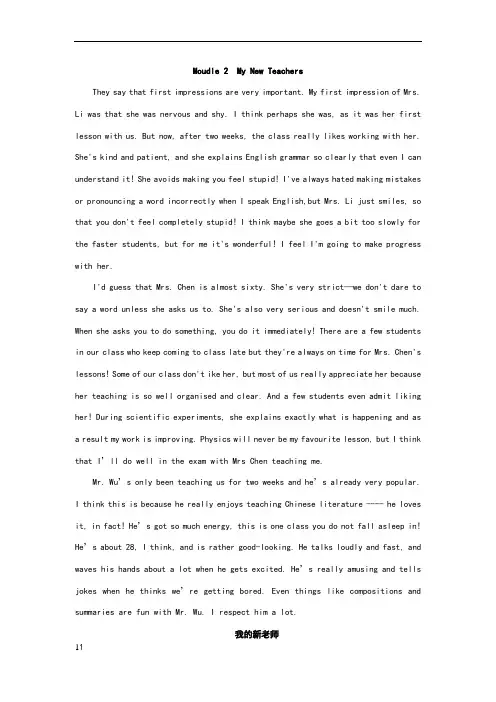
Moudle 2 My New TeachersThey say that first impressions are very important. My first impression of Mrs. Li was that she was nervous and shy. I think perhaps she was, as it was her first lesson with us. But now, after two weeks, the class really likes working with her. She's kind and patient, and she explains English grammar so clearly that even I can understand it! She avoids making you feel stupid! I've always hated making mistakes or pronouncing a word incorrectly when I speak English,but Mrs. Li just smiles, so that you don't feel completely stupid! I think maybe she goes a bit too slowly for the faster students, but for me it's wonderful! I feel I'm going to make progress with her.I'd guess that Mrs. Chen is almost sixty. She's very strict—we don't dare to say a word unless she asks us to. She's also very serious and doesn't smile much. When she asks you to do something, you do it immediately! There are a few students in our class who keep coming to class late but they're always on time for Mrs. Chen's lessons! Some of our class don't ike her, but most of us really appreciate her because her teaching is so well organised and clear. And a few students even admit liking her! During scientific experiments, she explains exactly what is happening and as a result my work is improving. Physics will never be my favourite lesson, but I think that I’ll do well in the exam with Mrs Chen teaching me.Mr. Wu’s only been teaching us for two weeks and he’s already very popular.I think this is because he really enjoys teaching Chinese literature ---- he loves it, in fact! He’s got so much energy, this is one class you do not fall asleep in! He’s about 28, I think, and is rather good-looking. He talks loudly and fast, and waves his hands about a lot when he gets excited. He’s really amusing and tells jokes when he thinks we’re getting bored. Even things like compositions and summaries are fun with Mr. Wu. I respect him a lot.我的新老师人们常说第一印象很重要。
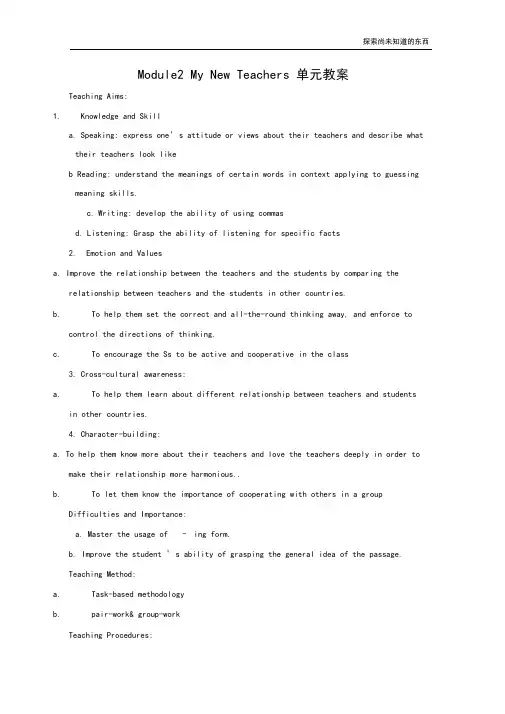
Module2 My New Teachers 单元教案Teaching Aims:1.Knowledge and Skilla.Speaking: express one' s attitude or views about their teachers and describe whattheir teachers look likeb Reading: understand the meanings of certain words in context applying to guessingmeaning skills.c.Writing: develop the ability of using commasd.Listening: Grasp the ability of listening for specific facts2.Emotion and Valuesa. Improve the relationship between the teachers and the students by comparing therelationship between teachers and the students in other countries.b.To help them set the correct and all-the-round thinking away, and enforce tocontrol the directions of thinking.c.To encourage the Ss to be active and cooperative in the class3.Cross-cultural awareness:a. To help them learn about different relationship between teachers and studentsin other countries.4.Character-building:a. To help them know more about their teachers and love the teachers deeply in order tomake their relationship more harmonious..b. To let them know the importance of cooperating with others in a groupDifficulties and Importance:a. Master the usage of –ing form.b. Improve the student ' s ability of grasping the general idea of the passage.Teaching Method:a. Task-based methodologyb. pair-work& group-workTeaching Procedures:Period 1Teaching Content: Vocabulary and listeningEveryday EnglishActivity 1. Ask the Ss to write ”+” for positive adjectives, and “-” fornegative adjectives. (Some words will have a positive and a negative meaning,depending on the context.)Activity 2. Ask the students to describe their teachers they know, using the words given above.For example: Our science teacher is very energetic and intelligent.I am fond of Mr. Li 's classes. They are never boring.Our English teacher is serious but his teaching style is well organized.Activity 3 Pair workDiscuss the following sentences True or False according to your own experiences. And share your opinions with your partner.1.All good teachers talk a lot.2.I think teachers need to be strict.3.I like teachers who are amusing and can laugh with their students.4.The most popular teachers are always very kind.5.Good teachers make sure that everyone in the class understands.6.Good teachers always return homework quickly.7.You should be able to ask your teacher questions at any time during a lesson.8.It doesn 't matter if a teacher is not organized.Activity 4 Listening.Listen to Alex, and English student, and tick the sentences above that he agreeswith. Compare your choices with Alex and have a discussion with your classmates what makes a good teacher.Activity 5 Everyday Englisha. Make sure the students know the meaning of the following expressions.Have you got that take a look kids that 's settled a couple of things it ' s up to youb. Complete the conversations with these expressions.Activity 5 Homework1.Memorize the adjectives we have learned in the class.2.You should know some adjectives have positive or negative meanings or both. Period 2Teaching Content: Reading and VocabularyActivity 1. Warming-up( brainstorming)Try to find out the positive adjectives to describe the three teachers in thetextbook. Activity 2 Pre-reading(prediction)Look at the pictures given in the textbook, make predictions about which subject do you think they may teach.Listen to the text and check your prediction.Mrs. Li _____________Mrs. Chen _____________Mr. Wu ______________Activity 3 Intensive readinga. skimming and scanning: Read the text silently and quickly to get the general idea. Thenanswering the following questions.1.Which teachers do the students like a lot?2.Who is a very good teacher but is serious and strict?b. detail reading: Answer the following questions according to the article.1.Which paragraphs tell us what the teachers look like?2.What subjects does each teacher teach?3.Who is the most popular teacher?4.Who is the kindest teacher?5.Which teacher are students most afraid of?6.Which teachers explain things clearly?Activity 4 Post-readingInterview: Interview some of your classmates about which teacher they would like to have and ask them to give specific reasons to support their own idea.Activity 5. Key points of the passage1.so ⋯thatadjectives/adverbadj.+a/an+n(singlular)so thatmany/few+n.(plural) many/little+n.(uc.)e.g. He ran quickly that we couldn ' t keep up with him.Bob is so tall a man that he can almost reach the ceiling.I 've had so many falls that I ' m black and blue all over.There was so little water left that only small children and patients were givensome.2.working with her 跟她学习3.avoid +doing appreciate+doingenjoy +doing hate +doingadmit +doing mind +doing 这些动词常用ing 形式做宾语。
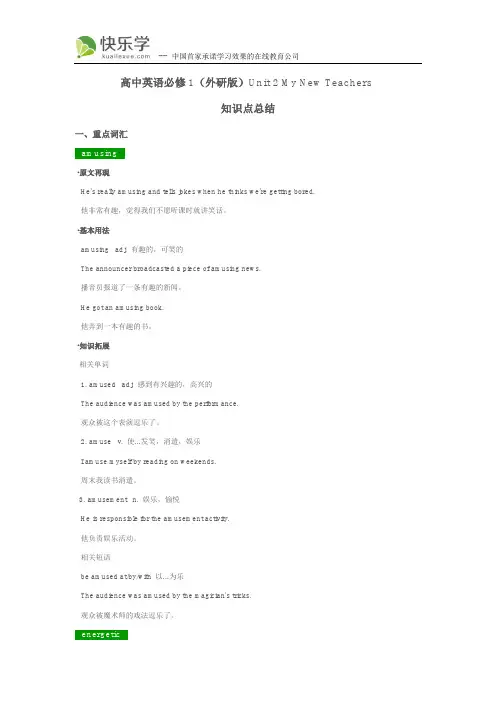
高中英语必修1(外研版)Unit 2 My New Teachers知识点总结一、重点词汇amusing·原文再现He's really amusing and tells jokes when he thinks we're getting bored.他非常有趣,觉得我们不愿听课时就讲笑话。
·基本用法amusing adj. 有趣的,可笑的The announcer broadcasted a piece of amusing news.播音员报道了一条有趣的新闻。
He got an amusing book.他弄到一本有趣的书。
·知识拓展相关单词1. amused adj. 感到有兴趣的,高兴的The audience was amused by the performance.观众被这个表演逗乐了。
2. amuse v. 使...发笑,消遣,娱乐I amuse myself by reading on weekends.周末我读书消遣。
3. amusement n. 娱乐,愉悦He is responsible for the amusement activity.他负责娱乐活动。
相关短语be amused at/by/with 以...为乐The audience was amused by the magician's tricks.观众被魔术师的戏法逗乐了。
energetic·原文再现She is an energetic woman.她是一个精力旺盛的人。
·基本用法energetic adj. 精力充沛的His son is an energetic child.他的儿子是个精力旺盛的孩子。
He seems an energetic person.他似乎是一个精力充沛的人。
You need to do something energetic and different.你需要做些积极的与众不同的事。
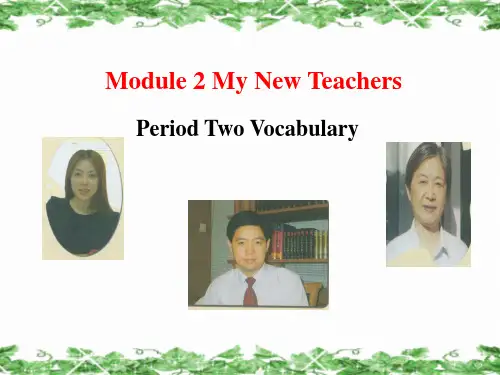
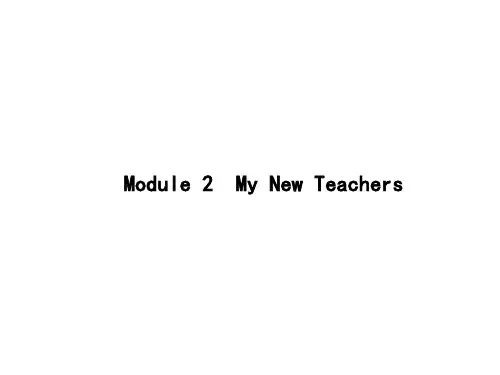
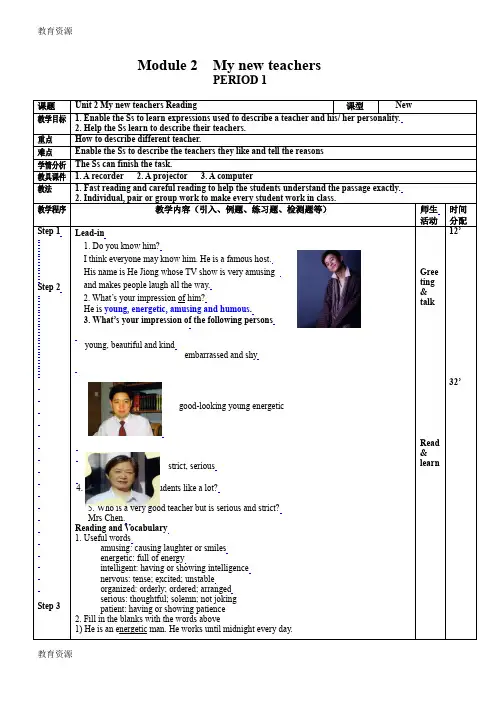
Module 2 My New TeachersPeriod 3Teaching Aims and Demands:1. New words: nervous, patient, serious, amusing, admit, appreciate, avoid,scientific, physics, literature, summaries, respect…2. Grammar: verbs followed by V–ing3. Writing: punctuation usage in writingAffection and attitudesUnderstanding new teachers and forming positive attitudes towards the studies of all subjects in senior high.Teaching ProceduresⅠ. Revision1.Help students to revise words that is learnt in Period Two of this module by doing Activity 2 P13.2.Help the students to review the adjectives used to describe a person by doing Exercise 5 (Workbook P74).Ⅱ. Grammar learningLead in the study of grammar by carrying out the following activities.1.What verbs have you found that can be followed by V-ing from the passageyou’ve just read?(Ask students to speak out the verbs like “like, avoid, hate, keep, admit, enjoy”)2.Look at the passage again. Ask the students to find the sentences with the verbs followed by V-ing.(Ask students to underline the sentences in the passage and then Teacher shows them on the screen with the verbs underlined.)3.Encourage the students to find out themselves why the sentences are written in this way by asking “What do you notice about the verbs that follow the underlined verbs?”(The students may work in pairs.)4.Collect the answers from the students.(The verbs are followed by the gerund rather than the infinitive used as the object of the verbs underlined.)5.Help the students to sum up the words they’ve learned which can be followed by V-ing.Ⅲ. Language useHelp students to learn to use the verbs followed by V-ing as object.1. Activity 2 P14.2. Get the students to work in pairs introducing each other by using the verbs in Activity 2?And then ask several pairs to act it out in class.3. Activity 3 P14.(Ask the students to write down 3 more true sentences about themselves usingthe words and then show their work on the screen.)IV. Writing1.As k the students to read any paragraph in “Reading and Vocabulary” again first.2. Gi ve the students each a piece of paper with the paragraph they’ve just readbut without any punctuations or any capitalized words. And ask the students to punctuate this paragraph, using full stops, capital letters, question marks and commas where necessary.( Show the students’ work on the screen and see if the students can do it correctly. There might be some differences from the punctuations used in the passage, but if they are acceptable, they are O.K.)1.Get the students to discuss why they punctuate the passage like this by askingsome questions.a)Why do you punctuate your passage like this?b)Why are punctuations important in writingc)What is also important besides punctuations in writing?( Help the students to sum up by themselves how to use punctuations in apassage. And remind them of the importance of punctuation marks and capital letters.)V. Practice1.Ask the students to punctuate the passage on P18.(Get the students to work on this individually and then check in pairs and Teacher can show two or three students’ work on the screen, so the students may have a discussion about whose is better and why. In doing this they can practice what they’ve learned just now.)2. If time is allowed, Teacher may prepare another passage without punctuations orcapital letters to give the students more practice.3. Ask the students to write a short description of their favourite teacher. Remindthe students to use capital letters, commas and full stops where necessary.( If there is still time in class, Teacher can show some students’ work on the screen, or else in the next period.)VI. Summary1.Gi ve the students some time to recall what they’ve learned in this class.( Ask the students to think by themselves first, then discuss in pairs and finally share in class.)2.Ask the students to call out as many verbs as possible which can be followed by V-ing.3.Get the students to say the adjectives used to modify a person.VII. A test1.To check the verbs followed by V-ing.( Maybe a blank-filling.)2.To check the adjectives to modify a person.( Maybe orally, for example ask the students to describe their favourite winners of the Olympic gold medals or maybe film stars.)Homework1.Prefer to the dictionary and try to get more adjectives used to modify a person. 2.Sum up the verbs which can be followed by V-ing and write them down in notebooks.3.Write a short passage describing their favourite sports stars or film stars, payattention to punctuations and capital letters.。
My New Teachers第二课时一、教材分析本课学习的内容是外研版新课标B1M2 My New Teachers的grammar 的一个课时。
课本内容包括:学习动名词的形式;学习形容词的用法;只能跟动名词形式的动词。
通过语法的学习掌握动词的用法,理解句子的成分,为英语学习打下坚实的基础。
二、教学目标1. 知识与能力目标Learn the v.-ing form.2.过程与方法Master its usage (as an object).3. 情感态度与价值观Some of the verbs can only be followed by v.-ing form, not infinitive form.v. -ing form and it is used as an object.Pair work or group work to get all the students to take part in the class.multimedia(一)导入T: Hello, boys and girls.Ss: Good morning, Miss Li.T: Sit down, please. Today we’re going to study the grammar: the v.-ing form used as an object in a sentence. OK. Let’s look at the screen.Show the following sentences on the screen:1. But now, after two weeks, the class really likes working with her.2. I’ve always hated making mistakes or pronouncing a word incorrectly....T: What speech are the underlined parts?S: We use nouns and pronouns as objects. Some other forms canalso be used as an object. v.-ing form is one.T: Can you find some examples in the reading passage?S: There are a few students who keep coming to class late....S: I think this is because he really enjoys teaching Chinese literature.T: Can you think of a sentence like this?S: I’ve finished reading the novel.S: I appreciate reading poems aloud.T: OK. Great. Thank you.T: Well, we know some verbs can be followed by v.-ing form. Let’s deal with this exercise. Complete the sentences with words from the box. There may be more than one answer. Change the form where necessary.1. The students _________copying from other students.2. Please _________ taking.3. Have you _________checking your work? It’s time to go home.4. You need to _________ speaking in English to make progress.5. He _________asking stupid questions!After the Ss discuss a while, check the answers.T: Sa, can you try the first one?Sa: Yes. Dislikes or hates.Answer:1.dislikes/hates 2. stop/keep 3. finished4.practice5. avoids1. Write three more true sentences about yourself. Use the words in the box.Example: I enjoy learning English, but I dislike remembering new words.T: Get ready, any volunteers? OK. Li Lei, please!Li Lei: I like reading English, but I dislike reciting the text.Wu Ping: I love swimming, but I hate practising a lot every day.Wang Lily: I enjoy reading English novels. I’ve finishedreading one this week.2. Choose the best meaning for these words.(1)Revision means _________ .a. stopping doing somethinb. changing somethingc. studying something again(2)Grammar is _________of a language.a. the vocabularyb. the rulesc. the tenses(3)If we fail an exam, we _________ .a. do well in itb. do badly in itc. don’t take it(4)When we write a summary of something, we _________ .a. answer a qeustionb. write down the answersc. only write down the main ideasT: Who will try?S: C. studying something again.T: Great! Well, next one.S: B. Grammar is the rules of a language.T: You did a good job. The third one?S: B. Fail an exam means doing badly in it.T: Very good. And now, the last one.S: C. When we write a summary of something, we only write down the main ideas.T: That’s right.T: In this class, we’ve learned the v.-ing used as an object. Try your best to memorize the verbs in this module that can be followed by an v.-ing form. So much for this period. Goodbye, boys and girls!(五)作业布置make some sentences with v.-ing form, using verbs in this unit.七、板书设计Module 2 My New Teaches1. The students _________ copying from other students.2. Please _________taking.3. Have you _________ Checking your work? It’s time togo home.4. You need to _________ speaking in English to make progress.5. He _________ asking stupid questions!八、教学反思★祝学习顺利★。